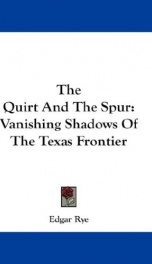the quirt and the spur vanishing shadows of the texas frontier

In 1909, former frontier judge and editor Edgar Rye introduced "The Quirt and the Spur: Vanishing Shadows of the Texas Frontier" to a reading public hungry for stories of this vanishing world. Drawing upon his experiences during the frontiers heyday, Rye focused on the area around old Fort Griffin during the 1870s, a time and place that was fast fading from memory. At the heart of the narrative stood The Flat, a wild yet vibrant frontier village attached to the fort. Peopled by the desperate and the hopeful, the adventurous and the opportunistic, The Flat was a place in the tradition of Dodge City and Tombstone, towns that became synonymous with western violence and lawlessness. More than any other single work of western Texas historiography, "The Quirt and the Spur" helped shape the perception of Old Northwest Texas as a wild and woolly frontier. Rye, who intended the work to bring pleasure to old friends, never anticipated that it would be taken as history. Indeed, he anticipated that his more exacting reader would find his yarns to be all wool and a yard wide. Nevertheless, in "The Quirt and the Spur" Rye successfully grasped at those vanishing shadows of the frontier past and set them down for posterity. Over the years, historians and writers have drawn upon the mythical Fort Griffin in their own works, and today Ryes opus is a staple in collectors libraries. --This text refers to the Paperback edition.
Info about the book
Author:
Series:
Unknown
ISBN:
0548265216
Rating:
4/5 (2)Your rating:
0/5
Languge:
English
Users who have this book
Users who want this book
What readers are saying
What do you think? Write your own comment on this book!
write a commentif you like the quirt and the spur vanishing shadows of the texas frontier try:
Other books by this author
Do you want to exchange books? It’s EASY!
Get registered and find other users who want to give their favourite books to good hands!

